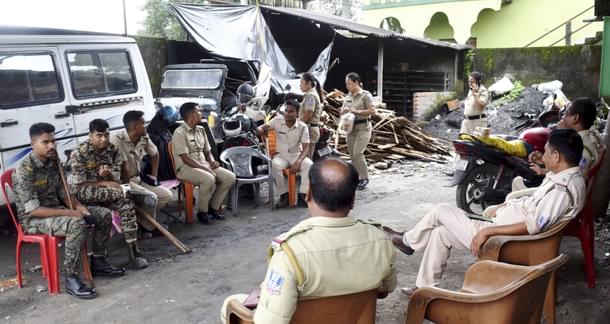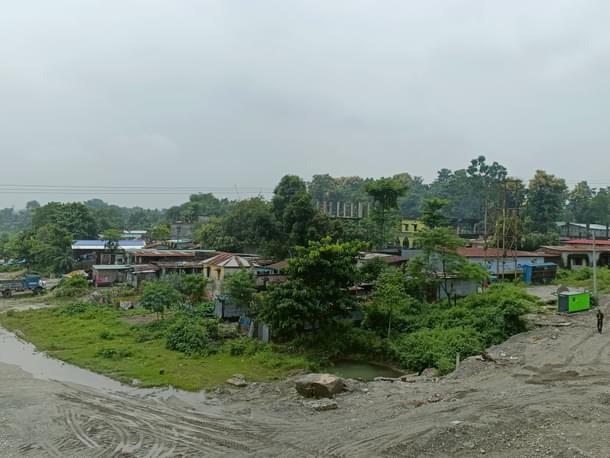Ground Reports
Siliguri’s ‘Chhota Pakistan’: A Den Of Criminals Of Suspected Nationalities Who Thrive Under Political Patronage
Jaideep Mazumdar
Aug 28, 2023, 03:54 PM | Updated 04:03 PM IST
Save & read from anywhere!
Bookmark stories for easy access on any device or the Swarajya app.


A squalid sprawl of about 300 huts and shanties on the western banks of the Balasan river that flows through the western part of Siliguri, the largest city in North Bengal, has a rather curious name--Lenin Colony.
No marks for guessing that it was so named by the erstwhile Marxist rulers of Bengal. But the area is now better known as ‘Chhota Pakistan’.
That’s not only because most of its residents are suspected to be illegal immigrants from Bangladesh and Rohingyas, but also because the area is a crime hub that shelters law-breakers.
‘Chhota Pakistan’ has been making it to the news regularly in recent years. Many criminals--thieves, burglars, chain-snatchers, railway wagon breakers and anti-social elements--who have been arrested by the police over the past few years hail from this ‘Chhota Pakistan’.
The area has hit the headlines again now with the arrest of a 22-year-old, Mohammad Abbas, who is accused of sexually assaulting and bludgeoning to death a Class 11 girl who was on her way back home from school last week.
Abbas, who is married with a child, had allegedly lured the Gorkha Hindu girl and taken her to a lonely spot where he sexually assaulted her. Her resistance and screams for help enraged Abbas, who allegedly smashed her head with a brick.
Though the police arrested Abbas within six hours, protests have swept across North Bengal. A VHP-sponsored bandh in Siliguri last week was successful, as was a bandh across the hills of North Bengal Saturday.
“The police have acted promptly. But people are angry because ‘Chhota Pakistan’ exists under patronage of the ruling party and criminals operate out of the area with impunity,” said leader of Opposition Suvendu Adhikari.
Darjeeling Lok Sabha MP Raju Bista, who has demanded a CBI enquiry into the heinous crime, said that such crimes by residents of ‘Chhota Pakistan’ is the direct result of the “shelter and support provided to illegal immigrants and criminal elements in North Bengal by the state government”.
“Our children and our womenfolk are not safe anymore because of the threat posed by illegal immigrants who are provided shelter and support by the ruling party for its narrow political ends,” said Bista.
“Mamata Banerjee says she won’t allow an exercise to update the NRC to be conducted in Bengal. That encourages more illegal immigration from Bangladesh and also gives immunity to criminal elements among these immigrants,” Bista added.
The BJP has been hitting the streets of Siliguri repeatedly over the last one week demanding action against illegal immigrants from Bangladesh.
The demography of the city, and most parts of North Bengal in fact, has changed over the last few decades with largescale influx of illegal immigrants from Bangladesh.
Muslims, most of them illegal immigrants or descendants of illegal immigrants from Bangladesh, form nearly 10 per cent of the city’s population and are in a majority in many pockets of the region.
Till a couple of decades ago, Muslims formed only about 3 per cent of the population of Siliguri. Many areas in districts across North Bengal, including areas close to vital defence installations, have become Muslim-majority in recent decades.



Presenting Chhota Pakistan:
This area was named ‘Lenin Colony’ by the local CPI(M) leadership during Left Front rule in Bengal.
It is a new settlement on the west bank of Balasun river and lies on the southern side of National Highway 10 that connects Phulbari on the Indo-Bangladesh border to Sikkim’s capital city Gangtok.
“This settlement grew by leaps and bounds over the last eight to ten years. It was all a barren land adjoining a tea estate. We started noticing some Muslim families, all illegal immigrants from Bangladesh, settling down there sometime around 2008 or 2009. And over the past eight to nine years, more and more Muslim families started settling down there,” said Bimal Nag, a resident of Paul Para that’s on the northern side of National Highway 10.
Paul Para is a stone’s throw away from ‘Chhota Pakistan’ and the residents of Paul Para have watched in horror and helplessness as the settlement of illegal immigrants grew in size and started posing a grave threat to the security of the entire area.
“It (Chhota Pakistan) is a haven for criminals, infested with drug dealers, human traffickers and all sorts of lawbreakers. We can make out from their dialect that they are all Bangladeshis. But all of them have rational cards and Aadhar cards and enjoy the protection of ruling party politicians and the police,” said Archana Banik, a housewife who stays near Kali Mandir on Nivedita Sarani which is also across the highway from ‘Chhota Pakistan’.
The dirty lanes lined with grimy shanties and huts in ‘Chhota Pakistan’ wear a forbidding look. Visitors and outsiders are eyed with suspicion and even outright hostility.
“Even police don’t enter the area if they are not sufficient in numbers and armed. The criminals there are said to possess illegal arms and are quite ferocious,” said Gobinda Pal, owner of a shop selling pots and planters on NH 10, a little distance away from ‘Chhota Pakistan’.
The suspicion that the 300-off families of ‘Chhota Pakistan’ are illegal immigrants from Bangladesh appears to be well-founded. All of them speak in a distinctive Bangladeshi dialect.
That many of them are Rohingyas is also apparent from their language: they speak in the Rohingya dialect that bears a close resemblance to Chatgaiya, the dialect of Chittagong, a province in northeastern Bangladesh that is next to the Rakhine state of Myanmar.
Rohingyas are inhabitants of Rakhine state.
Though they try to speak ‘proper’ Bengali (the dialect of Nadia is considered to be shudh or pure Bengali), they are not successful in doing so and frequently lapse into Bangladeshi dialects, especially the Rangpuri and Rajshahi dialects.
That’s because most of the illegal Bangladeshi immigrants who have settled down in North Bengal are from the Rangpur and Rajshahi divisions of northwestern Bangladesh adjoining North Bengal.
The few residents of ‘Chhota Pakistan’ who agree to answer questions admit that the settlement is new and they all came to reside in the area only a few years ago.
But they vehemently deny that they are illegal immigrants from Bangladesh. “Our farmland and homestead land in Malda was washed away and we had nowhere to go. So we came and settled down here,” said Manowara Bibi, 35, a resident of a shanty who runs a small shop selling tea, cigarettes, gutka and other such items.
“People label us as Bangladeshis, but we are all Indians,” she asserts before producing an Aadhar card issued in 2020.
Asked why she applied for and received her Aadhar card only three years ago, Manowara Bibi, a mother of six, glibly replies: “All our documents and possessions got washed away during the floods in Malda in 2018”.
This refrain--about losing earlier documents due to floods--is common among all residents of ‘Chhota Pakistan’. All of them claim to be climate refugees from Malda and North and South Dinajpur districts.
But quiz them about the areas or villages in those districts they came from, and they will turn hostile before clamming up.
Nurul Azzam, a 30-year-old who works as a helper in a small automobile repair workshop near Bagdogra airport, is a bit more imaginative in his responses.
“I suffer from memory loss, so I don’t recollect the name of my original village in Dinajpur,” he says.
Asked about the Rohingya/Chittagong dialect that he speaks in, he says that one of his neighbours at the Dinajpur village he grew up in migrated from Chittagong sometime in the early 1940s.
“I picked up this dialect from them,” he says. But he bristles at being quizzed further and turns aggressive. “What business do you have to ask me where I am from and what language I speak in. I have cards,” says Azzam, who has two wives and has fathered seven children from them.
By ‘cards’ he means Aadhar, ration and voter ID cards. “Go away. I have work to do,” he says when asked to show his ‘cards’.
But he adds mockingly: “I voted two years ago (in the Assembly elections) and will vote again next year”.
“What are next year’s elections about?” he is asked. That riles him and he murmurs some expletives in Chatgaiya (the dialect of Chittagong that’s very close to the dialect of Rohingyas) and turns away.

Radicalisation of the illegal immigrants
There are two makeshift mosques in the area and the clerics there are also suspected illegal immigrants from Bangladesh.
These clerics, it is learnt, teach the regressive and radical version of Islam to the immigrants, thus turning them into Islamists.
The clerics, who wield absolute control over the community, are reportedly close to some local Trinamool Congress leaders now. Earlier, they were patronised by the CPI(M).
These clerics are entrusted with ensuring the complete support of all residents of ‘Chhota Pakistan’ during elections for the ruling party.
In return, they are showered with favours and goodies. One cleric stays in a two-storied house, owns a motorcycle and runs a store selling consumer goods near Shiv Mandir More in Siliguri.
His ‘prosperity’ presents a stark contrast to the poverty of his fellow Muslims at 'Chhota Pakistan’.
The residents of the locality are all engaged in menial jobs of daily labourers, rickshaw pullers, helpers in bicycle and tyre repair shops, rag pickers and other such activities which fetch them a subsistence income.
That, and the police and political patronage they enjoy, emboldens them to take to crime to earn more.
‘Chhota Pakistan’ is widely known to be a den of drug peddlers. The police have raided the area many times and seized drugs like marijuana, but the peddling continues nonetheless.
Some of the residents there are suspected to be involved in human trafficking. ‘Chhota Pakistan’ also offers safe refuge to many who commit crimes in other parts of the city and even surrounding areas of the region.
Given the notoriety that ‘Chhota Pakistan’ has earned, the BJP is now demanding that the antecedents of all the members of the 300-odd families of the region be thoroughly checked and the illegal immigrants among them be detected and deported.
But such demands are summarily rejected by the ruling Trinamool Congress which disapproves of the moniker given to Lenin Colony.
“There are no illegal immigrants in Lenin Colony. All of them are Indians,” asserts Siliguri Mayor Gautam Deb.
‘Chhota Pakistan’ will, thus, remain protected and will only draw more illegal immigrants. It is growing, and an ‘annexe’ of the colony has started coming up on the opposite bank (the right or eastern bank) of Balasun river adjoining the Matigara tea estate.
And with that happening, the crime graph of the city is bound to shoot northwards. But that is of little concern to the ruling politicians whose only interest lies in winning the next elections.
And who cares if it is illegal immigrants who contribute in a large measure to their victory.





